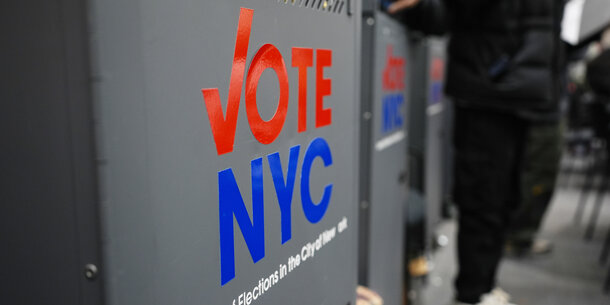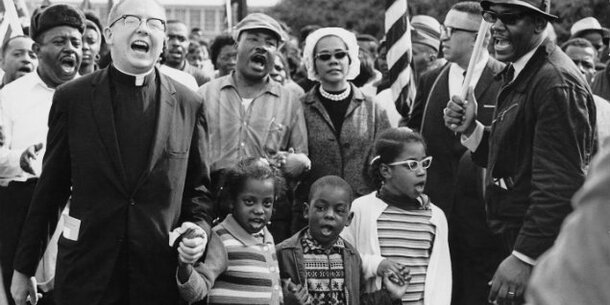This week, the House will vote on the For the People Act (H.R. 1/S.1), the greatest civil rights bill since the civil rights movement itself. In a year rich with historic symbolism — the first time a woman has held national office, the first time a Confederate flag was walked through the U.S. Capitol — the bill could not come at a more fitting moment.
If Vice President Kamala Harris embodies an inclusive American future, the violent insurrection fueled by lies about voter fraud of Black and brown citizens whispers to a not-distant, exclusionary past. As these two visions of America clash, seemingly irreconcilable, this bill offers astounding hope. It would fundamentally transform our democratic institutions to benefit everyone, but especially those most impacted by our democracy’s historical failings. Paired with the John Lewis Voting Rights Advancement Act, these reforms are our best opportunity in a half century to achieve a truly inclusive America.
How far we still must go was evident this past election: following years of voter suppression efforts, Donald Trump and his allies unapologetically targeted Black and brown votes in their baseless attempt to overturn the election result. Extreme partisan gerrymandering — which deprives people of fair representation in government — persisted, often targeting communities of color. And campaign finance dominated by big money maintained barriers for diverse candidates and communities seeking to have their concerns heard. One major consequence is self-evident: the new Congress remains 77 percent white and 74 percent male in a nation where women are the majority and people of color are 40 percent of the population.
The For the People Act offers transformative change to meet these systemic challenges. This begins with protecting the franchise, which was under siege even before the Supreme Court gutted the Voting Rights Act in 2013 in Shelby County v. Holder. The bill’s practical reforms address the failures we encounter like clockwork every election — long lines and overly aggressive purges, particularly in minority communities — that cause Americans to ask how this could persist in the 21st century. The bill includes two weeks of early voting so everyone need not stand in line on one lone Tuesday, as well as automatic and same-day voter registration so arbitrary administrative hurdles and purges don’t determine access to the ballot. It also restores the vote to all formerly incarcerated citizens and allows people who lack photo ID to vote with sworn affidavits of their identity.
These reforms benefit everyone in a well-functioning democracy, but many specifically redress harms against communities most impacted — and targeted by — voting restrictions. Early voting opportunities matter for minimum wage workers who lack flexible scheduling on Election Day: of those earning minimum wage or less, 62 percent are women, many women of color. While registration restrictions often target minority communities, same-day registration is an antidote popular among marginalized communities: a survey of 2012 election data in North Carolina found Black women were 24 percent of registered women voters, but 34 percent had used same-day registration. And voter identification alternatives help communities least likely to have ID. Nineteen percent of Native Americans lack qualifying identification, compared to under 12 percent of other possible voters. In Texas, one can vote with a handgun license, but not a student ID. This choice is not race-neutral: in 2018, over half of University of Texas students were minorities, while over 80 percent of handgun licenses went to white Texans.
The For the People Act also implements structural changes addressing inequities in who can run for office. This will advance a Congress that better reflects Americans’ diverse lived experiences — and may deliver policy that speaks more directly to those experiences. Under current campaign finance structure, moneyed elites have an advantage in running, and fewer than 5 percent of House members cite having ever held a blue-collar job.
Through a new small-donor matching system, the bill gives more candidates viable means to run without relying on the wealthiest contributors, who are overwhelmingly white and male. Thanks to this imbalance, candidates of color, especially women, must work more than their white counterparts to raise competitive funding. This bill would match small donations of $200 or less at a six-to-one ratio, funded through a surcharge on corporate lawbreakers. This would significantly close the fundraising gap for female candidates of color, who typically rely most on small donors.
The bill would also help non-wealthy Americans run by confirming that campaign funds can be used for everyday expenses like childcare. This changes the current status quo, where candidates can use campaign funds to rent a tuxedo but need special permission from the Federal Election Commission to pay a babysitter.
Finally, the bill contains critical congressional redistricting reforms promoting fair representation. The bill’s ban on partisan gerrymandering would halt the frequent targeting of minority communities because of their perceived partisan affiliation, and its reforms maintaining “communities of interest” allow those with shared values to vote as a bloc and elect candidates who reflect their interests.
Ultimately, the reforms of the For the People Act address an old truth. Our democracy has always been aspirational — “All men are created equal” meant “men” alone and was written by a slaveholder. From this worldview, our nation’s original government, by design, excluded people from democracy based solely on their sex and skin color. Today’s inequities are the inheritance of that choice.
But today also offers a choice: surrender to the crushing failures of the past, or choose an optimistic America — where citizens of all kinds have animated a slaveholder’s words in Seneca Falls and Selma, at Stonewall and beyond. The For the People Act will profoundly yet practically forward an inclusive democracy, long overdue. Passing it would be a testament to American optimism — and a foundation upon which to build our future.



